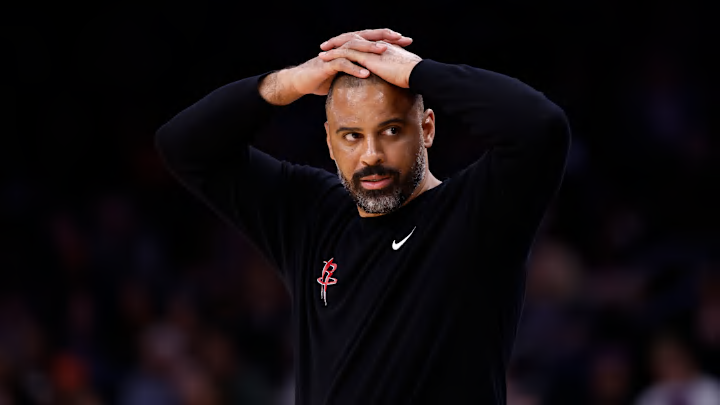As the Houston Rockets have started the season on a ridiculously hot offensive streak, their most surprising improvement has been in their shooting from beyond the arc.
Through their first 12 games, the Rockets are first in the NBA in 3-point percentage, currently knocking down 42.6% of their attempts from that range. Yet, against the Orlando Magic, they saw a marked dip in their attempts, and, while their shooting numbers held steady, this could be the first sign that their unsustainable performance is beginning to drift.
On the season, they have averaged just 30 3-point attempts per game (which is the lowest mark in the NBA). However, the 20 attempts they took against the Magic, combined with a cold shooting night from that range for Kevin Durant and the absence of Tari Eason, bode poorly for their chances of maintaining their scorching rate even on such low volume.
It shouldn't be surprising, but the Rockets won't shoot 40% from three for the whole season
Heading into the season, everyone knew that Houston was aiming to take immense strides offensively after their lackluster performance a season ago. However, almost no one expected them to be as dominant as they have been to this point in the season.
As it stands, they are first in offensive rating, first in offensive rebound percentage, first in 3-point percentage and second in points per game. Although teams have been able to limit them during certain matchups, Houston has still been able to find a way to get their star players going, and their excellent record is a direct result of their ability to do so.
Yet, their hot shooting start is founded on a number of unsustainable performances. Alperen Sengun, a career non-shooter from beyond the arc, is hitting 44.7% of his threes this season. Josh Okogie is hitting 45.7% of them. Tari Eason, before he sustained his oblique injury, was shooting over 50%.
Eason's absence, particularly, could serve as a microcosm for the decline that is incoming. The Rockets have seen a number of impressive shooting performances from unexpected players, and Eason has been one of them. In his absence, the team is missing a player who has been a crucial floor spacer them to this point in the season.
When these players start to miss time or even just return to their normal shooting rates, it is likely that there will be a major drop for Houston in that category.
Thankfully, their offense is not dependent upon their ability to shoot from beyond the arc. Instead, the Rockets have founded their attack this season on their ability to grab offensive rebounds, allowing the team open looks on second-chance opportunities.
Moreover, the excellent play of Durant and Alperen Sengun in isolation has enhanced their ability to rotate the ball to the right spots given the extra attention those players command from opposing defenses.
Therefore, it should be no surprise that Houston will eventually come back down to earth, and Eason's absence could very likely accelerate that descent. Yet, the team has enough tools and offensive intensity to survive such a dip: a marked difference from a season ago.
